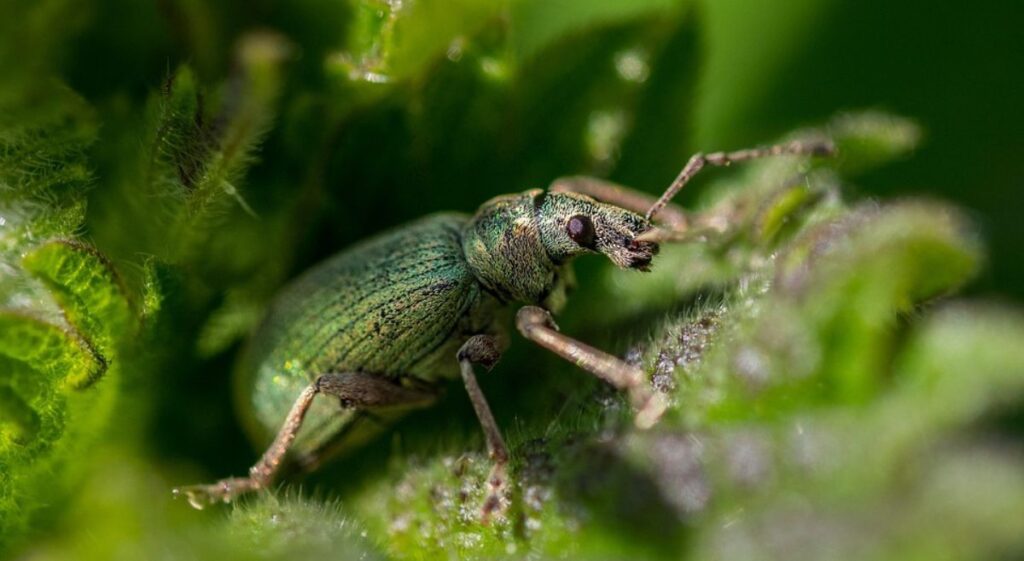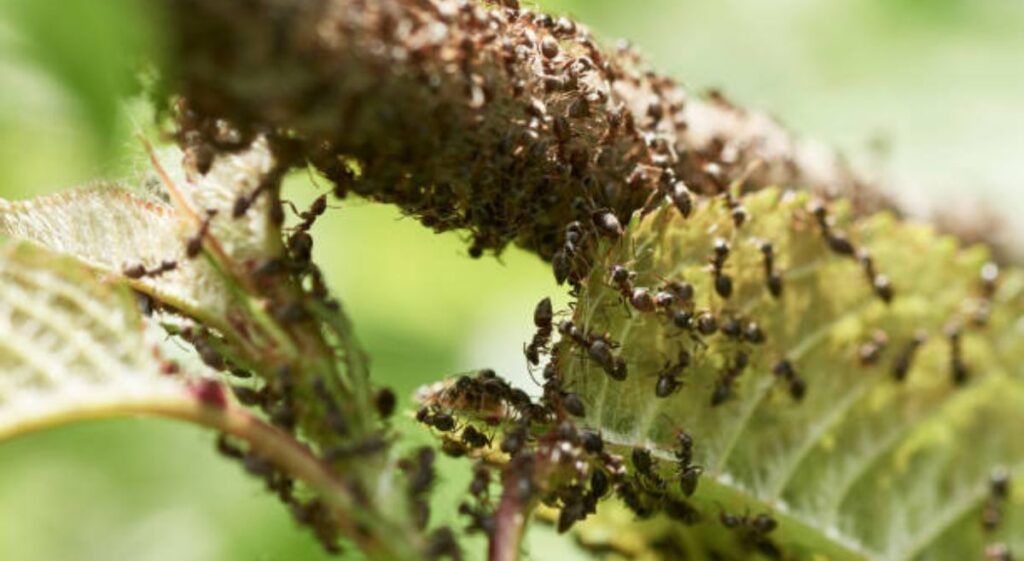Introduction:-
Keep Your Garden Pest-Free: Top 10 Organic Methods

Organic gardening extends beyond a trend; it’s a sustainable practice that fosters a healthier ecosystem. Many gardeners grapple with the challenge of controlling pests without resorting to harmful chemicals. Fortunately, there’s a plethora of organic methods to keep your garden pest-free. Discover the top 10 organic pest control methods for a thriving, chemical-free garden.
Organic Methods to Keep Your Garden Pest-Free
1. Beneficial Insects: Nature’s Pest Control

Beneficial insects like ladybugs, lacewings, and predatory beetles act as natural pest controllers in your garden. They feast on common garden pests such as aphids, mites, and caterpillars. To attract them, plant flowers like dill, fennel, and marigolds, or purchase them from a garden supply store.
2. Companion Planting: Enhancing Growth and Deterring Pests
Companion planting involves strategically growing certain plants together to enhance each other’s growth or deter pests. For instance, planting basil near tomatoes helps repel tomato hornworms, while marigolds planted near other vegetables can deter nematodes and aphids.
3. Neem Oil: A Natural and Effective Pesticide
Derived from the seeds of the neem tree, neem oil is a powerful natural pesticide. It disrupts the life cycle of pests, preventing their maturation and reproduction. Neem oil is safe for humans, pets, and beneficial insects when used correctly. Apply it directly to plants as a foliar spray for effective pest control.
4. Diatomaceous Earth:
Diatomaceous earth, a powdery substance derived from fossilized aquatic organisms, effectively dehydrates pests such as slugs, beetles, and ants. To create a barrier that pests are reluctant to cross, sprinkle it around the base of plants.
5. Garlic Spray:
Garlic, a versatile ingredient beyond culinary use, acts as an excellent natural pest repellent. Create a homemade garlic spray to deter aphids, beetles, and spider mites. Combine garlic with water, strain the mixture, and apply it directly to your plants for effective pest control.
6. Soap and Water Solution:
A simple mixture of liquid soap and water offers an effective solution for controlling soft-bodied pests like aphids and whiteflies. The soap disrupts their protective outer layer, leading to dehydration. Spray this mixture directly onto the pests for optimal results.
7. Row Covers for Pest Protection
Lightweight fabrics known as row covers can be draped over plants to safeguard them from insects. These covers permit sunlight and water to reach the plants while acting as a barrier to keep pests at bay. This technique is particularly effective in protecting young plants from caterpillars and beetles.
8. Crop Rotation to Disrupt Pest Life Cycles
Rotating crops from season to season can disrupt the life cycle of pests. Different plants attract different pests, so by implementing crop rotation, gardeners can prevent pests from establishing a strong presence in their gardens.
9. Hand-Picking Pests for Immediate Control
While it may seem time-consuming, hand-picking pests off plants is an effective and immediate solution. This method works well for larger pests such as caterpillars, beetles, and slugs. Regularly inspect plants and manually remove any pests found.
10. Mulching with Organic Materials for Pest Deterrence
Mulching with organic materials like straw, leaves, or grass clippings can deter pests by creating a physical barrier. Additionally, mulch helps retain soil moisture and regulates temperature, promoting healthier plant growth.
How does companion planting help in organic pest control?
Companion planting leverages the inherent relationships between different plants to reduce or eliminate the reliance on chemical pesticides in organic pest control.

1. Natural Pest Repellants:
Certain plants repel pests through their scent, taste, or other attributes. For example, marigolds deter aphids, nematodes, and harmful insects due to their strong scent. Planting marigolds alongside vegetables offers protection against these pests.
2. Beneficial Insect Attraction:
Some plants attract beneficial insects like ladybugs, lacewings, and parasitic wasps that feed on common garden pests. Dill and fennel attract ladybugs that prey on aphids, while yarrow and cosmos attract parasitic wasps that control caterpillars.
3. Crop Disguise:
By planting crops with varying heights, colors, and scents together, pests become confused and have difficulty locating their preferred food sources. For instance, the scent of tomatoes can be masked by planting basil nearby, making it harder for pests to find them.
4. Trap Crops:
Certain plants are more attractive to pests, making them ideal as sacrificial plants. Nasturtiums, for example, lure aphids away from other plants, acting as a trap crop.
5. Improved Plant Health:
Companion planting can enhance soil quality, increase pollination, and provide shade or support, leading to healthier plants. Stronger plants are more resistant to pests and diseases, reducing the need for interventions.
6. Biodiversity:
Cultivating a diverse range of plants promotes a balanced garden ecosystem. This diversity helps maintain natural predator-prey relationships, minimizing pest outbreaks and fostering a healthier, more resilient garden.
Companion planting is a cornerstone of organic gardening, offering a sustainable, chemical-free solution for pest management. By harnessing the natural connections between plants, gardeners can create a harmonious and productive garden environment.
Conclusion
Maintaining a pest-free garden organically requires diligence and the right techniques, but the benefits are well worth the effort. By using these top 10 organic methods, you can protect your garden from pests while promoting a healthier environment. Embrace these practices, and enjoy the satisfaction of a thriving, chemical-free garden.
References
· Rodale Institute. (2021). The Benefits of Companion Planting. Retrieved from https://rodaleinstitute.org
· National Pesticide Information Center. (2020). Neem Oil General Fact Sheet. Retrieved from http://npic.orst.edu
· University of California Agriculture and Natural Resources. (2022). Using Beneficial Insects for Natural Pest Control. Retrieved from https://ipm.ucanr.edu
· Organic Gardening Magazine. (2019). Natural Pest Control: Diatomaceous Earth in the Garden. Retrieved from https://www.organicgardening.com
· The Spruce. (2023). How to Use Garlic Spray in the Garden. Retrieved from https://www.thespruce.com
· Mother Earth News. (2021). Homemade Organic Insect Spray. Retrieved from https://www.motherearthnews.com
· Michigan State University Extension. (2020). The Importance of Crop Rotation for Pest Control. Retrieved from https://www.canr.msu.edu
· The Old Farmer’s Almanac. (2023). Mulching in the Garden: Benefits and How to Mulch Correctly. Retrieved from https://www.almanac.com
FAQ
What Are the Most Effective Organic Pest Control Methods for Vegetable Gardens?
Vegetable gardens are particularly susceptible to pests, but organic methods such as introducing beneficial insects, using neem oil, and practicing crop rotation can effectively manage pest populations without harming the environment.
How Can I Naturally Repel Aphids from My Plants?
Aphids can be repelled naturally by spraying a mixture of water and mild soap, introducing ladybugs to your garden, or planting companion plants like garlic and chives that deter aphids.
